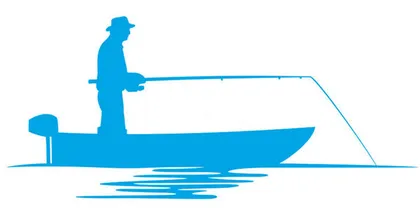Pursuit as Happiness (Excerpt)以逐为乐(节选)
作者: 欧内斯特·海明威 河之洲/译、导读

【导读】读这篇故事,我们有一种似曾相识的感觉,即想到了作者海明威的代表作《老人与海》。两个作品写的都是钓鱼经历,前者是写实,后者是虚构。一战后的1928—1931年间,海明威在美国佛罗里达州和古巴度过了一段安详的岁月,狩猎、捕鱼和写作成了他的生活日常,本篇故事就是写这个时候的事。《老人与海》虽然写成于1950年,但其中诸多描述却源自海明威在古巴期间的生活经历。对比两篇作品不难发现,写的都是钓大鱼的经历,但后者做了更多的情节延伸和艺术升华。本篇中是三个人合作并使用先进的钓具进行海钓,《老人与海》中则是老人孤身一人划着小船、使用简陋的钓具出远海钓到一条更大的鱼。此外,《老人与海》中还添加了古巴当地的风情、海上各种生物的活动、与鲨鱼搏斗的不易、棒球文化、老人对青年时代的回忆等情节描述。所以通过这种艺术加工,《老人与海》相较于这个短篇的故事而言,情节更丰富、描写更细腻、思想更高远、旨趣更浓烈。但如此种种,如果海明威本人没有相关经历,他很难写得这么真实。一言以蔽之,艺术源于生活,高于生活。我想,读者和笔者一样,通过比较阅读,一定能更深刻地理解虚构与现实,或艺术与生活的关系。
We did not see him again for an hour and twenty minutes. The current was very strong and it had carried us down to opposite Cojímar1, which was about six miles from where the fish first sounded2. I was tired but my hands and feet were in good shape3 and I was getting line on him now quite steadily being careful never to pull harshly or to jerk. I could move him now. It wasn’t easy. But it was possible if you kept the line just this side of the breaking point.
我们有一小时二十分没再看见它。水流湍急,将我们带到远离科希马尔的方向,这里距离鱼初次潜入水底的地方约六英里。我累了,但手脚还都好使。我正在不断地收紧钓线, 小心翼翼,避免突拉猛拽。我这会儿能拉动它了,虽不够轻松,但还是可能办到,只需确保钓线不至于扯断就行。
“He’s going to come up,” Carlos said. “Sometimes the great ones do that and you can gaff4 them while they are still innocent5.”
“它就要游上来了。”卡洛斯说,“大家伙有时就这样,趁它们还懵懵懂懂,就能用挽钩把它们拉上来。”
“Why does he come up now?” I asked.
“它为何要这会儿游上来呢?”我问道。
“He’s puzzled,” Carlos said. “And you’re leading him. He doesn’t know what it is about.”
“它是闹不清,”卡洛斯说,“而且你正用线牵着它,它不知道是咋回事儿。”
“Don’t ever let him find out,” I said.
“别让它回过神儿来。”我说。
“He’ll weigh over nine hundred dressed out6,” Carlos said.
“这条鱼能出九百多磅肉。”卡洛斯说。
“Keep your mouth off of him,” Mr. Josie said. “You don’t want to work7 him any different, Cap?”
“别张口鱼闭口鱼的了。”乔西说,“你不想换种遛法吗,船长?”
“No.”
“不想。”
When we saw him we knew how really big he was. You couldn’t say it was frightening. But it was awesome. We saw him slow and quiet and almost unmoving in the water with his great pectoral fins8 like two long purple scythe9 blades. Then he saw the boat and the line started to race off the reel10 as though we were hooked to a motorcar, and he started jumping out to the northwest with the water pouring from him at each jump.
看见鱼的时候,我们才真的知道它有多大;虽不能说大得吓人,但确实大得让人吃惊。我们看见它慢悠悠地安静游着,在水中几乎一动不动,巨大的胸鳍像两柄长长的紫色大镰刀。接着它发现了船,钓线开始从线轴上飞速扯出,我们就像钩住了一辆汽车一样。它开始沿着西北方向跃出水面,每跳一次都掀起水浪。
I had to go into the bow11 again and we chased him until he sounded. This time he went down almost opposite the Morro12. Then I worked my way back to the stern13 again.
我不得不再次走到船头的位置。我们追着它跑,直到它钻到水下。它这次几乎是逆着莫罗城堡的方向下潜逃跑的。之后我慢慢挪步回到船尾。
“Do you want a drink, Cap?” Mr. Josie asked.
“要喝一杯吗,船长?”乔西问。
“No,” I said. “Get Carlos to put some oil in the reel and not spill it and put some more salt water on me.”
“不用。”我说,“让卡洛斯给钓线轴上点儿油,不要搞洒了。再在我身上淋点儿海水。”
“Can’t I get you anything really, Cap?”
“真不能帮你做点儿啥吗,船长?”
“Two hands and a new back14,” I said. “The son of a bitch is as fresh as he was at the start.”
“给一双手,再让我的背完好如新。”我说,“这个狗娘养的,精神头儿还像刚开始那么好。”
The next time we saw him was an hour and a half later, well past Cojímar, and he jumped and ran again and I had to go into the bow while we chased him.
我们再次见到它是一个半小时之后,船已远离科希马尔。它跳出水面,再次飞奔起来,紧紧追赶中我也只好移步到船头的位置。
When I got back to the stern and could sit down again, Mr. Josie said, “How is he, Cap?”
我回到船尾,能再次坐下来的时候,乔西说:“什么情况,船长?”
“He’s just the same as always. But the temper is starting to go out of the rod15.”
“从始至终它一直没啥变化,但是钓竿就快要没弹性了。”
The rod was bent like a full-drawn bow. But now, when I lifted, it did not straighten as it should.
钓竿弯得像一张拉满的弓,我现在提起来的时候,本该变直的竿并未回直。
“She’s still got some left,” Mr. Josie said. “You can stick with him forever, Cap. You want some more water on your head?”
“还是有点儿弹劲儿的。”乔西说,“你可以跟鱼一直摽着,船长。还要给你头上淋点儿水吗?”
“Not yet,” I said. “I’m worried about the rod. His weight has just taken the temper out.”
“先别了。”我说,“我不放心钓竿,鱼太重已经把竿掰得没弹劲儿了。”
An hour later the fish was coming in steadily and well and he was making big slow circles.
一个小时后,鱼一点一点地顺利靠近,它正兜着大圈儿,游得很慢。
“He’s tired,” Carlos said. “He’s going to come in easy now. The jumping has filled up his air sacs16 and he can’t go deep.”
“它累啦。”卡洛斯说,“它会很容易地贴过来。跳的时候它鳔里面灌满了空气,就没法钻到深水里啦。”
“The rod’s gone,” I said. “She won’t straighten at all now.”
“钓竿完蛋了,”我说,“现在一点儿也直不起来了。”
It was true. The rod’s tip now touched the surface of the water and when you lifted to raise the fish and to reel to take up line the rod did not react. It was not a rod anymore. It was like a projection of the line. It was still possible to gain a few inches of line each time you lifted. But that was all.
是真的,竿头现在垂到水面上,提竿拉鱼和卷钓线的时候,竿毫无反应。现在它不是一根钓竿了,而像是突出来的一截钓线;虽然每次提竿还能拉起几英寸长的线,但仅此而已。
The fish was moving in slow circles and as he moved on the outgoing half of the circle he took line off the reel. On the incoming circle you gained it back. But with the temper gone out of the rod you could not punish him and you had no command over him at all.